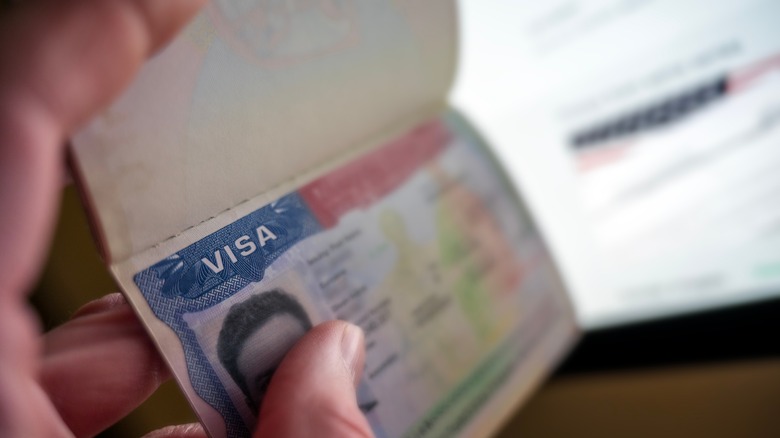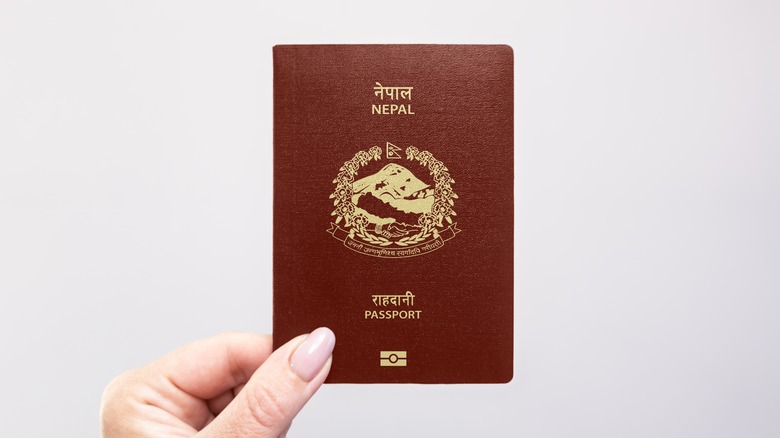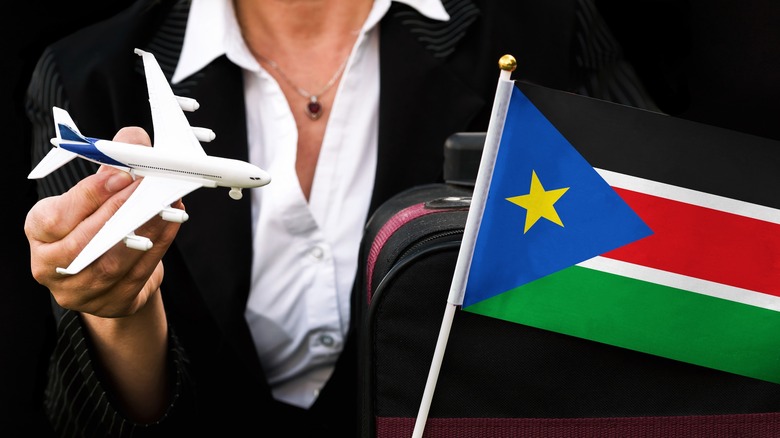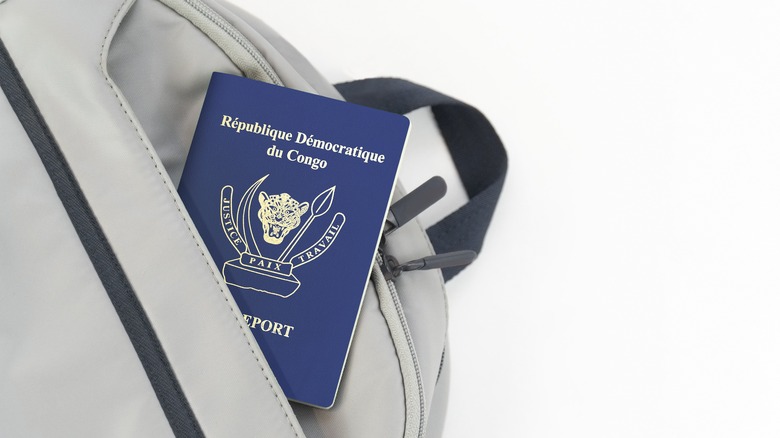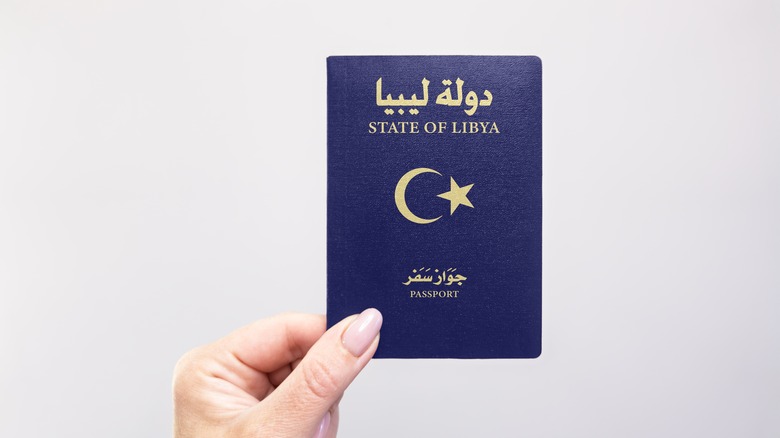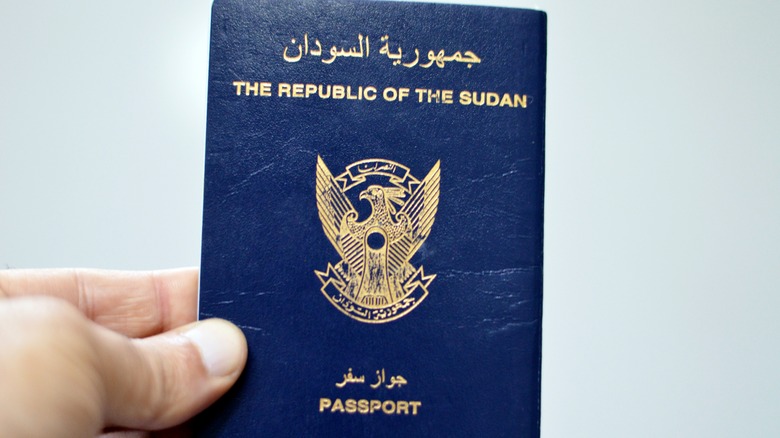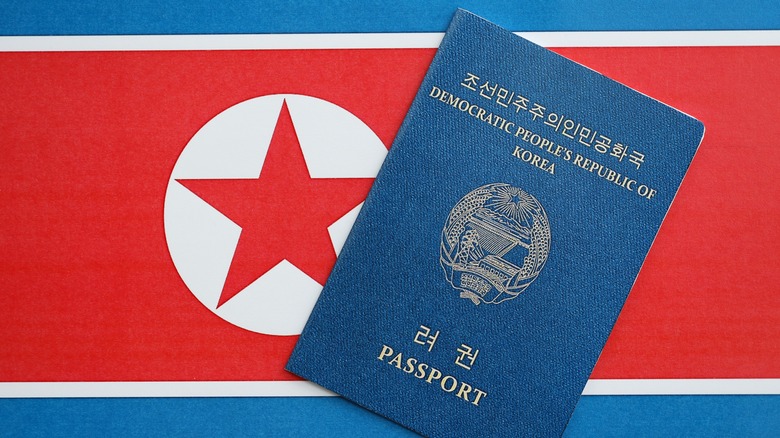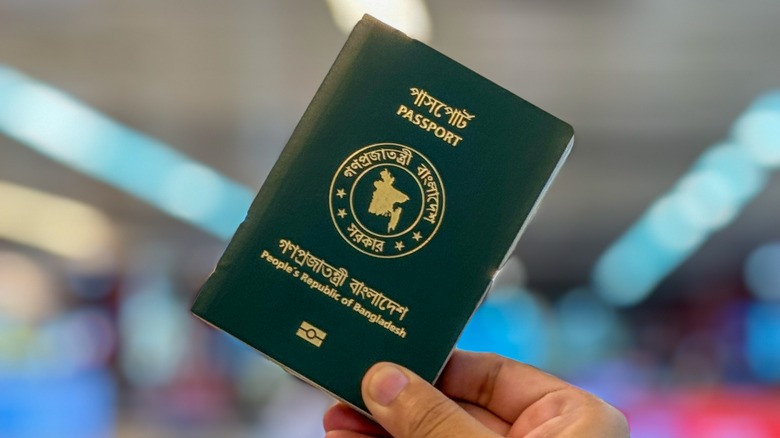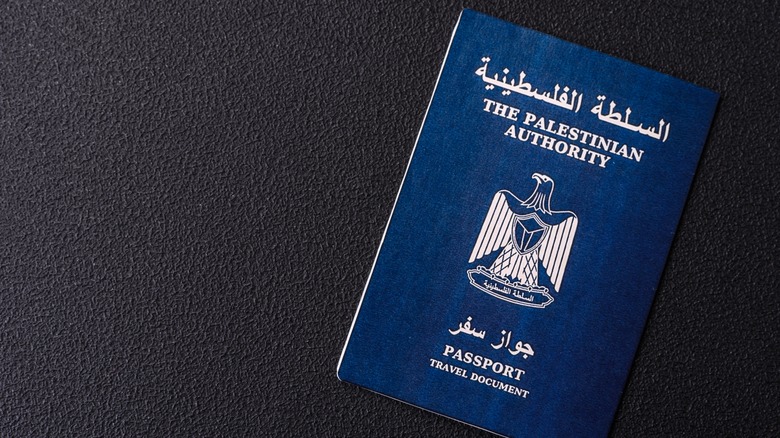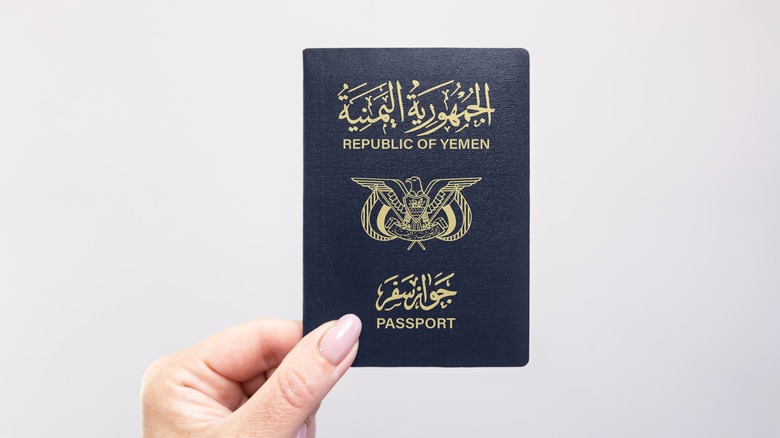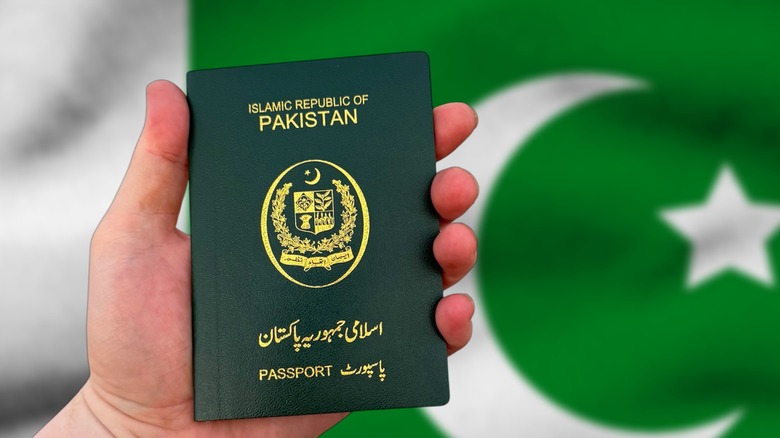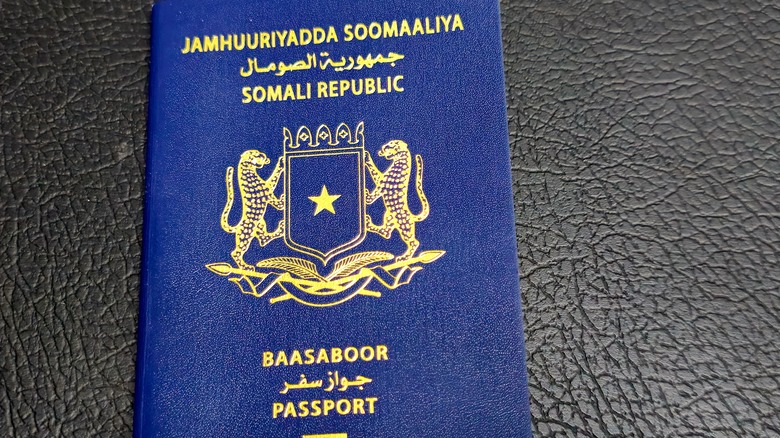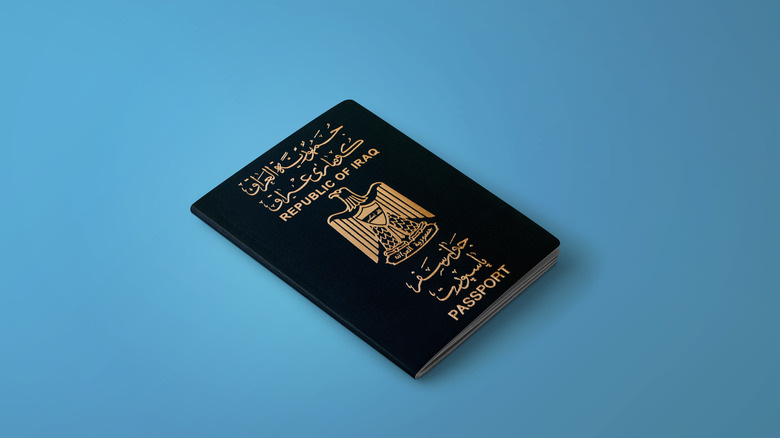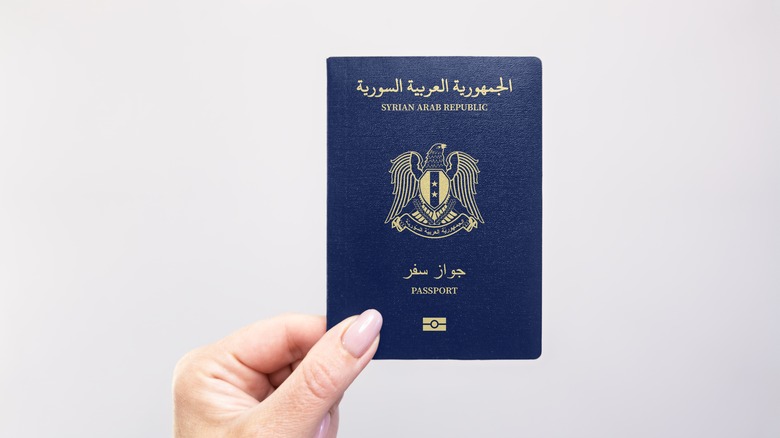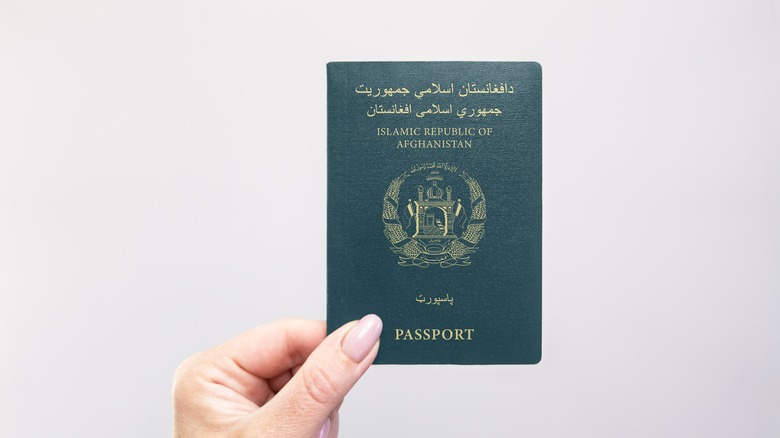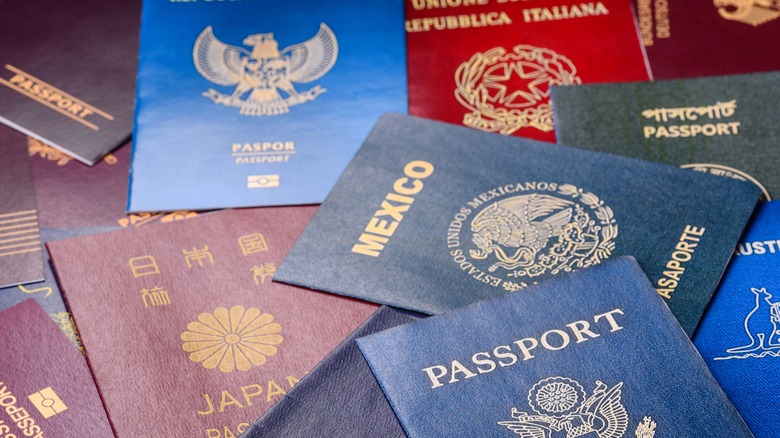The 15 Least Powerful Passports In The World In 2025
The concept of weak and strong passports has been around for ages, but people have been paying extra close attention to them since the COVID-19 pandemic. In the U.S., many started looking for destinations with safer shores, less restrictions, and a different political climate. The most wealthy looked to second passports that would allow them to easily integrate into greener pastures. Others tried getting visas that would give them access to their destination of choice. But depending on where they wanted to go, some found themselves restricted by the weakening of the usually strong U.S. passport.
European destinations that Americans would normally not need a visa to travel to, closed their doors. This included popular destinations like France, Italy, and Spain, which all followed the European Union's directions to restrict access due to the America's health policy. Even tiny Caribbean nations like Grenada and the Bahamas, with its crowd — free islands and clear turquoise waters — stopped allowing U.S. passport holders to fly into their airports. However, they still allowed visa-free access for Canadians, Europeans, and travelers from the U.K. Suddenly, passports and the mobility they offered became a greater issue.
Mobility is the most important advantage of a passport. Henley & Partners and Passport Index, the two major passport-ranking organizations, which each include data from 199 countries, use mobility (the number of destinations a passport grants visa-free or nearly visa-free access to) as the most important ranking factor. When two or more nations rank for the same spot, Passport Index goes one step further and breaks the tie using Human Development Index (HDI) scores from the United Nations, which includes only 193 countries. These scores measure quality of life, which predicts a nation's global reputation, both contributing factors to passport strength. We preferred Passport Index's 2025 ranking for their more precise ranking system.
Nepal (54 destinations)
With visa-free access to 11 of the 199 countries surveyed by Passport Index, and the ability to get an electronic visa or visa-on-arrival to 43 other countries, Nepal has one of the least powerful passports in the world. The mountainous nation, home to Mount Everest and incredible hiking trails, has endured a deadly civil conflict and recent internal unrest, which deposed the country's prime minister. Both events may have affected its global perception, thereby affecting the willingness of other countries to allow easy access. But according to a report in the The Kathmandu Post, now that the civil conflict (which ended in 2006) is over, there are other reasons for Nepal's weak passport.
In the article, Nischal Nath Pandey, director of the Centre for South Asian Studies (CSAS), explained these reasons. For one, Pandey says that among some Nepalese, there is a widespread issue of staying longer than a visa legally allows. According to him, in the past, more nations were willing to issue visas on arrival to holders of Nepal's passport. However, the practice of over-staying those visas prompted these nations to stop that policy. He went on to explain that this is also a problem with certain types of passports. "The misuse of diplomatic passports by our politicians is also one big reason for the lack of credibility of our passports," he said.
South Sudan (53 destinations)
The nation of South Sudan was born in 2011 and almost immediately ranked among the countries with the weakest passports. Citizens face hardships brought on by continuous armed conflicts that have left millions destitute, ill, and trying to relocate to neighboring countries. This internal instability along with the millions of citizens seeking refugee undoubtedly affect the country's perception internationally, and is likely partially responsible for a passport that allows visa-free, ETA, or visa-on-arrival entry to only 53 destinations (via Passport Index).
The nation's passport allows visa-free travel to 17 countries, and visa-on-arrival or electronically approved visa travel to 36 more. The 2023 Human Development Index (HDI) report sheds more light on other issues affecting South Sudan's global reputation. Children can expect an average of five years of schooling, life expectancy at birth is 57.6 years, and there is high poverty. These factors contribute to the nation's HDI score of 0.38 (among the lowest) and a ranking at 193 out of the 193 countries on HDI's list.
Democratic Republic of the Congo (53 destinations)
Democratic Republic of the Congo, a nation in Central Africa not to be confused with its neighbor, The Republic of Congo, makes the list of the world's least powerful passports in 2025 due to having visa-free access to only 11 countries, visa-on-arrival to 35 countries, and electronic travel visas to just two countries (via Passport Index). Like some of the other African nations with weak passports, the Democratic Republic of the Congo's limited international mobility is mostly due to armed internal conflicts in some parts of the country.
Irregular armed groups have captured whole areas of the nation, destabilizing regions and causing high crime rates. Members of international organizations are not immune to the violence either. Many present in the nation to provide aid have they themselves become victims of crime, prompting their home countries to issue security advisories warning them to leave the nation. The Democratic Republic of the Congo continues to score low on the Human Development Index with a rank of 171 out of their 193 nations for a life expectancy of 61.9 years, low GDP, and expected schooling of only 10 years for children.
Libya (52 destinations)
Responding to violent attacks on the civil rights of Libyan citizens, members of NATO engaged in military action in Libya in 2011, making the nation a major subject of the news at the time. Since then, continued instability has splintered the society as well as led to sanctions and other international rebukes. The result is a world where Libya is largely isolated from its international counterparts.
Without solid diplomatic relationships, it is difficult to enjoy reciprocal mobility, but current conditions in the nation make establishing these ties difficult. Politically, Libya is stratified with numerous parties constantly wrestling for governmental leadership. This unstable political atmosphere leaves a state of confusion that makes it difficult for other nations to maintain relations. The nation's weaker passport is one of the results of these prevailing conditions. With mobility access to only 52 destinations, 14 visa-free and 38 with visa-on-arrival or electronic visa, it is one of the weakest in the world in 2025, according to Passport Index.
Sudan (52 destinations)
From as far back as 1980, droughts and famine spurred competition for sparse resources like land and water, ultimately leading to deadly conflicts in Sudan. Of course, a clash in ideologies and political affiliations worsened the situation, culminating into the Darfur Civil War of 2003. The ongoing war, civilian conflicts, and unrest have impacted regular citizens immensely, with murders, crime, and displacement affecting both quality of life and international perception.
Naturally, as with other countries on this list, these factors all translate to a passport that is more restricted than other countries in the world. Some Sudanese people who have passports may or may not want to leave their country, but for those that do, the ability to visit only 13 countries visa-free and 39 with visa-on-arrival or electronic visas (via Passport Index) makes their journeys all the more difficult.
North Korea (51 destinations)
If you happen to hold a passport from North Korea, you can travel to only nine countries without a visa and get a visa-on-arrival or electronic visa at 42 more (via Passport Index). Quality of life may be questionable inside the nation, according to the international nonprofit organization Liberty in North Korea, but the main reason for its weak passport is a political regime that isolates North Korea from most of the international community.
The segregation from the rest of the world is mostly self-imposed. After World War II, Korea was split into two distinct nations, North and South, with a demilitarized strip you can actually visit today. Kim ll-Sung, the leader who came to power at the time, favored a "Juche" policy for North Korea's new government. In its simplest form, "Juche" is complete self-reliance, with the market, army, and governmental ideology being free from outside influences, and gave the leader complete control over North Korea. Today, North Korea's passport's ranking as one of the least powerful in the world reflects this estrangement.
Bangladesh (50 destinations)
Passport Index notes that Bangladesh's passport allows visa-free access to 15 countries and visas-on-arrival or electronic visas to 35 countries, placing it among the least powerful in the world. The main reason for Bangladesh's low ranking is a spotty international reputation due to immigration practices which have prompted other nations to impose restrictive visa policies. But Bangladesh's reputation isn't the only issue — it also suffers from limited diplomatic relationships.
Without more embassies, securing the agreements needed for visa-free travel continues to be elusive. On a more positive note, the nation has a Human Development Index score of 0.685, putting it in the medium range and pretty close to a high HDI, which begins at 0.70. The nation also ranks at 130 out of 193 nations, which may signal better things to come in the future.
Palestinian territories (50 destinations)
Without widespread political recognition as a state, it is difficult to have a strong passport. This is the predicament holders of a passport from the Palestinian territories find themselves in. Recognition for the Palestine as a sovereign nation is an issue that is still being resolved, with many nations still on the side of abstaining from recognition as of this writing (October 2025). Without these diplomatic ties, Palestinians find that only some nations recognize their passport or will allow them visa-free entry, although this may change in the future.
The ongoing conflict with Israel, which has displaced many and severely affected quality of life for those still in Palestine, also plays a part since this is an indicator that affects passport strength. Currently, a passport from the Palestine territories is one of the least powerful with visa-free travel to 11 countries and a visa-on-arrival or electronic visa to 39, according to Passport Index.
Eritrea (50 destinations)
If you haven't heard of Eritrea before, you're not alone. Like its neighbors, Sudan, Ethiopia, and Djibouti, the East African nation has historically been afflicted with difficulties. The nation formed after a 30 year battle won it independence from Ethiopia in 1993. But since then, it has suffered from media repression, military rule, and environmental threats that have contributed to high levels of poverty.
While Ethiopia offered a chance at regularized diplomatic relations in 2018, the current condition between the neighbors is anything but peaceful. At the time of this writing, a new conflict was on the horizon. Its difficult past and an uncertain future add up to a passport ranked as one of the least powerful in 2025, according to Passport Index. Holders have visa-free access to 11 nations and visa-on-arrival or electronic visa to 39 others.
Yemen (46 destinations)
In 2025, Yemen is still involved in a civil war that started in 2014. The complicated crisis is a story with many facets. The historical religious rift brews in the background, with certain religious groups and the government they ousted in 2014 — including President Abd Rabbuh Mansour Hadi, who had to flee the country for Saudi Arabia. Since then, there has been a proxy struggle that has been marked by military conflict and violence that has impacted Yemeni citizens (via the Council on Foreign Relations).
The latest iteration of the conflict saw the country becoming involved with the Israel-Gaza war, which has heightened tensions in the area and affected cost-of-living and general safety in the area. With conflict always on the horizon, it isn't strange that Yemen holds one of the world's weakest passports in 2025. According to Passport Index, holders can travel to nine nations visa-free and 37 others with a visa-on-arrival or an electronic visa.
Pakistan (45 destinations)
Pakistan's passport ranks as one of the least powerful passports in the world in 2025 because of a few things. With only nine countries allowing visa-free travel and another 36 issuing visas-on-arrival or electronic visas (via Passport Index), holders of the country's passport find themselves onerously restricted because of how Pakistan is perceived internationally.
Public perception plays a role in how weak or strong passports are. Past issues with document fraud, certain cases where people stayed beyond the terms of their visas or using the wrong visas certainly factored in. Additionally, security threats from some groups within Pakistan have a reputation for terrorist attacks against those they view as enemies. Although these are often issues in regards to attitudes and stereotypes perpetuated by other countries, the result is a passport that is weak by all measures.
Somalia (44 destinations)
Somalia, one of the nations on the United States' "do not travel list," has suffered various setbacks over the decades. The country has been considered unstable since a coup in 1991 overthrew the military government. Since then, the nation has suffered from an ongoing civil war led by different groups jostling for leadership in pockets of the nation. One area of Somalia, Somaliland, had broken away but was once again drawn into conflict in 2023.
Environmental factors like drought and famine have led to poverty and starvation, and other restrictions of civil liberties have been widely reported. All of these conditions combined, naturally, translate into a weaker passport, which allows mobility to a total of 44 countries, including 10 allowing visa-free access and another 34 allowing for visas-on-arrival and electronic visas (via Passport Index).
Iraq (44 destinations)
Although Passport Index's ranking was mostly used for this list, there is consensus among both the Passport Index and the Henley Passport Index that Iraq has the third weakest passport in the world. The passport allows visa-free travel to only eight nations and to 36 others with a visa-on-arrival or electronic visa. Although it's one of the countries involved in TikTok's "danger tourism" trend, the nation faces a host of issues ranging from those that affect quality of life to a damaged reputation.
Citizens face a diminished quality of life from disappearing water sources, according to Chatham House. The domino effect of which has been hunger in some areas, as well as poverty and disease. The nation also endured two major military actions in two decades: a U.S.-led military invasion in 2003 and another escalation in 2017. With a reputation of instability and a fairly low quality of life, it's easy to see why the Iraqi passport is one of 2025's weakest in the world.
Syria (39 destinations)
Syria has the second-least powerful passport in 2025, according to Passport Index. With prolonged internal unrest and deadly citizen repressions isolating it from neighboring Middle Eastern counterparts, it seems strange that Syria is one of the high-risk countries people still willingly travel to. There's a long history of unrest in the country, including deadly protests in 2011, civil war, and other instances of civilian conflicts throughout the years, which have been condemned by other nations and human rights groups.
All this started a period of isolationism that lasted until 2023 when Syria's other Middle Eastern neighbors began mending fences. While regional relations with Syria may be improving, the passport is still ranked near the bottom of the list. The passport allows visa-free entry to only six nations, while 33 will issue a visa-on-arrival or an electronic visa.
Afghanistan (38 destinations)
If you are a holder of an Afghanistan passport, you may travel to only three countries visa-free and get a visa-on-arrival or electronic visa at 35 others, according to Passport Index. There was a time when the nation was home to an attraction on the list of iconic destinations that no longer exist. That's in the past. Today, Afghanistan has a major issue with its global perception due to severe restrictions on civil liberties which, in turn, has led to rapid economic downturn.
The United States removed its forces from Afghanistan in 2021 after a long war that began in 2001, leaving an interim government in place. The swift exit inevitably led to more power struggles which imposed strict laws on many citizens that walked back a lot of previous policies from the last 20 years. International reaction was just as swift — Afghanistan lost aid donations amounting to 40% of its GDP, according to an analysis also by Passport Index. Today, the nation suffers from isolation due to its human rights record and financial struggles — and has a passport reflective of its isolation.
Methodology
In writing this list, we had to decide which of the two most popular passport ranking organizations to use. Both have published lists for 2025, but their ranking systems are slightly different. Henley & Partners exclusively uses the number of destinations a passport grants visa- free access and visa-on-arrival access to as the ranking factor. Passport Index also gives the number of destinations a passport allows visa-free access to, called their Mobility Score, premium place.
However, where there is a tie between nations, Passport Index uses the United Nations Development Program's Human Development Index (HDI) to break the tie as a country's quality of life affects international perception and thus passport quality. We used Passport Index's more precise list for this article with some supplementation from Henley & Partners and the Human Development Index, offer some insight as to possible reasons why certain passports ranked lower than others based on analysis from these institutions as well as other organization, reputable news sources like the BBC, and scholarly sources like Brittanica.
